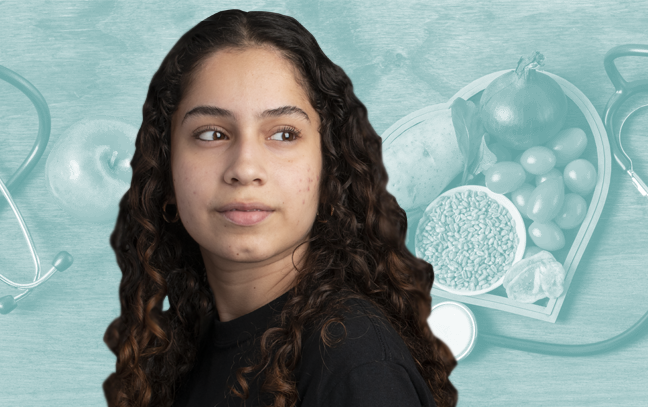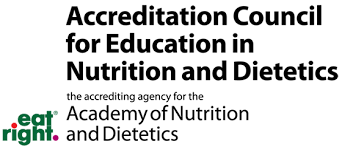
Become a Dietitian and Promote Good Health through Food
If you feel like your mission in life is to inspire others to see food and nutrition as a building block for better health—being a dietitian may just be your passion. The Bachelor of Science in Nutrition/Dietetics program at IUP prepares you to lead individuals, groups, and organizations to use food as a way to promote health and prevent disease.
You'll get to choose one of two concentrations from the BS in Dietetics program:
- Culinary Dietetics
- Food and Health Promotion
After graduating with your BS in Dietetics you'll be eligible to apply to a Dietetic Supervised Practice Program at the Masters level. Or you'll be able to apply to take the NDTR exam or apply for a position in the field in:
- The food industry
- Food administration
- Research
- WIC - nutritionist
Why Earn Your Nutrition and Dietetics Degree at IUP?
As a dietetics student, you'll be well prepared for a variety of fast-growing careers that help address our collective health concerns.
- Enrich your studies by adding a minor, another degree, or overseas study.
- Join organizations like the Student Association of Nutrition and Dietetics (SAND) so you and other students in the program can learn with and support each other.
- Learn from distinguished faculty who will guide you throughout your four-year program.
- Volunteer with local organizations and events. These off-campus experiences allow you to put what you're learning into practice while you expand your professional network.
What You’ll Learn as a Nutrition/Dietetics Major
Because learning doesn't happen only in class, you'll learn through hands-on instruction that combines the best classroom technologies with community activities. You'll have opportunities to share your passion for food and nutrition with the local community and with specific groups like athletes, children, community leaders, and other health professionals.
You'll build a strong foundation for your future career through a balanced blend of courses in:
- Clinical
- Community nutrition
- Cultural food
- Food experimentation
- Food preparation
- Food service management
Imagine Your Future
As a nutrition and dietetics professional, you'll enter a field that impacts everyone, everywhere. Across the nation, there's growing interest in healthier lifestyles and understanding how food choices play a role in our health.
You'll be able to help by offering guidance on how our eating habits affect us, and how people can make healthy choices.
As a graduate of IUP's program, you'll have a wide range of opportunities to share your expertise and passion for food and nutrition as a pathway to health. Areas of interest include:
- Clinical nutrition
- Community nutrition
- Food service management
- Integrative and functional nutrition
- Nutrition education
- Policy-making
- Research
- Sustainable food practices
Classes and Requirements
Food and nutrition is a very broad area of study. As a student in nutrition/dietetics program, you'll get a very well-rounded education. Some of the wide-ranging topics you'll learn are:
- Careers in food and nutrition
- Experimental foods
- Food and culture
- Hospitality purchasing
- Human resource management
- Integrative and functional nutrition
- Nutrition and disease
- Nutrition counseling
- Sustainability in food and nutrition
Completing the nutrition/dietetics program prepares you to apply for a dietetics-supervised practice that is accredited by the Accreditation Council for Education in Nutrition and Dietetics (ACEND). This is an accredited supervised practice on your way to becoming a registered dietitian.
If you successfully complete the BS in Food and Nutrition, you'll earn your ACEND-accredited Didactic Program in Dietetics verification statement. With this verification statement, you are eligible to sit for the Nutrition and Dietetics Technician Registered exam.
Full Academic Catalog Listing
The course catalog is the official reference for all our degree and course offerings. Check it out for a full listing of the classes available and requirements for this degree.
- Loading...
Accreditation Council for Education in Nutrition and Dietetics
ACEND serves the public by establishing and enforcing eligibility requirements and accreditation standards that ensure the quality and continued improvement of nutrition and dietetics programs. The Indiana University of Pennsylvania DPD program has been granted accreditation by the Accreditation Council for Education in Nutrition and Dietetics (ACEND) of the Academy of Nutrition and Dietetics until June 30, 2029.
Mission
The mission of the IUP Didactic Program in Dietetics is to provide superior educational opportunities combining theory and practice in an intellectually challenging and diverse environment, helping to prepare students for supervised practice leading to eligibility for the CDR Credentialing Exam to become a registered dietitian nutritionist.
Program Goals and Outcome Measures
Goal 1
The graduate will be a competent entry-level registered dietitian nutritionist after completing their DPD and supervised practice program.
- At least 80 percent of program students will complete program/degree requirements within six years (150 percent of the program length.)*
- The program's one-year pass rate (graduates who pass the registration exam within one year of the first attempt) on the CDR credentialing exam for dietitian nutritionist will be at least 80 percent.*
- At least 50 percent of program graduates will apply for admission to a supervised practice program prior to or within 12 months of graduation.*
- At least 50 percent of program graduates will be admitted to a supervised practice program within 12 months of graduation.*
- At least 75 percent of DPD graduates will agree or strongly agree that they are well prepared for a supervised practice program.
- At least 80 percent of dietetic supervised practice program directors or their designee will agree or strongly agree that the program graduate is well prepared for their current assignment.
Goal 2
The graduate will be academically prepared for employment and/or graduate education in a food and nutrition or related field.
- At least 80 percent of DPD graduates who respond to a survey within one year of graduation will "agree" or "strongly agree" that they were well prepared for their current position in food and nutrition.
- At least 80 percent of those who respond to a survey within one year of graduation who are currently in a graduate education program will "agree" or "strongly agree" that their undergraduate academics prepare them for graduate school education in nutrition or a related field.
- At least 70 percent of DPD students with a junior standing will have a GPA > 3.0 after posting of spring semester grades.
- At least 70 percent of program graduates who respond to an exit survey administered during the semester of graduation will "agree" or "strongly agree" that they have received quality academic advising.
* ACEND Required Objectives
For questions regarding program data and the program’s national examination one-year pass rate, please contact the program director, Jodie Seybold at jseybold@iup.edu.
Program Outcomes Data
Complete outcomes data for the program are available upon request. Individuals may request this information from the DPD director, Nicole Clark, DCN, MS, RDN, LDN, CDCES, nclark@iup.edu.
Accreditation
The Indiana University of Pennsylvania DPD program has been granted accreditation by the Accreditation Council for Education in Nutrition and Dietetics (ACEND) of the Academy of Nutrition and Dietetics until June 30, 2029. 
Accreditation Council for Education in Nutrition and Dietetics
120 South Riverside Plaza
Suite 2190
Chicago, Illinois 60606-6995
Phone: 1-800-877-1600 Ext. 5400; 312-899-0040 Ext. 5400
Email: acend@eatright.org
ACEND exists to serve the public by establishing and enforcing eligibility requirements and accreditation standards that ensure the quality and continued improvement of nutrition and dietetics programs.
Graduation and Program Completion Requirements
Students in the Dietetics Track (DPD program) must complete all coursework outlined in the Dietetics curriculum sheet and based on IUP's graduation policies. Students are eligible for graduation once all courses have been successfully completed and the student has earned at least 120 credits, met the university's graduation requirements, and applied for graduation. Per university policy, students must complete their undergraduate degree in no more than six years.
Students who have earned an undergraduate degree in any major, who would like to become a registered dietitian, are eligible to apply to the IUP Master of Science in Food and Nutrition Dietitian-Nutritionist program. Please contact Jodie Seybold for more information about this program at jseybold@iup.edu
2024 Graduate Degree Requirement: Registration Eligibility
Effective January 1, 2024, the Commission on Dietetic Registration will require a minimum of a master’s degree to be eligible to take the credentialing exam to become a registered dietitian nutritionist (RDN). To be approved for registration examination eligibility with a bachelor’s degree, an individual must meet all eligibility requirements and be submitted into CDR’s Registration Eligibility Processing System (REPS) before midnight Central Time, December 31, 2023. For more information about this requirement, visit the CDR website.
Academic and Program Calendar
The DPD program adheres to the academic calendar of the Indiana University of Pennsylvania.
Contact Us
For additional information regarding the Indiana University of Pennsylvania Didactic Program, please contact:
Dr. Nicole A. Clark, DCN, MS, RDN, LDN, CDCES
Director of the Didactic Program in Dietetics
911 South Drive
Ackerman 102
Indiana, PA 15705
724-357-3128
nclark@iup.edu
Additional Program Costs
For undergraduate tuition and fees, please visit the Office of Student Billing.
Dietetics Track
In addition to the tuition and fees determined by IUP, students in the Dietetics track will have additional costs, including:
- Books: $1,000/academic year
- Foods laboratory uniform pieces: up to $100
Membership in the following organizations is strongly encouraged:
- Academy of Nutrition and Dietetics: $58/year
- Pittsburgh Academy of Nutrition and Dietetics (PitAND): $10/year
- Student Association of Nutrition and Dietetics: $40/academic year
Culinary Nutrition Concentration
Students who choose the culinary nutrition concentration will have additional fees pertaining to completion of their certification through the Academy of Culinary Arts. See more information.